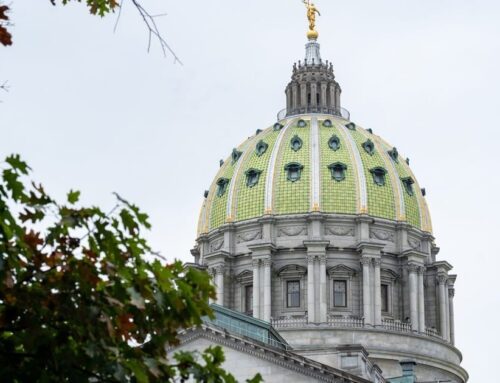Easton keeps property taxes stable for 2026 budget, despite ‘challenging fiscal environmen
October 1, 2025
EASTON, Pa. — Easton’s 2026 budget will, once again, feature no tax increase on residents, Mayor Sal Panto Jr. announced Wednesday during his presentation to City Council.
The mayor’s budget would hold the city property tax rate at 24.95 mills, meaning the owner of a home valued at $100,000 for tax purposes again would pay a tax bill of $2,495.
The budget totals $70,886,050, a 0.9% decrease from the current 2025 budget.
Describing it as a “responsible budget in a challenging fiscal environment,” Panto pointed out the difficultly in making ends meet via expenditure controls.
Plenty of work had to be done to reign in expenses as revenue remains relatively flat for the city, the mayor said.
“Continued inflationary pressures on labor, materials, utilities, equipment, health care, vehicles and projects” required an “adaptive response” for the budget, he said.
“Thankfully, this is a growing city and people and families are moving back to the city,” Panto said. “That means increases: our Earned Income Tax increase of $794,000.”
Panto said the increase is about 7.9%, coming from new residents in apartment complexes such as The Marquis.
Panto pointed to the increase in development across the city as a sign of solid financial management. He said few if any developers would look at Easton for $100 million projects if taxes increased every year.
But with costs such as a professional fire department running in the realm of $11 million and $12 million, covering the budget gap becomes a challenge, the mayor said.
“My administration always placed that burden on our visitors, not our residents,” he said. “We haven’t raised real estate taxes in 18 years.
“And we will not be raising them again next year, saving our seniors — more than 5,000 seniors live in the city of Easton, 12.9 percent — money that they would either be spending on groceries, prescription drugs or utilities or housing expenses.”
Easton City Council has until Dec. 31 to approve the budget.
Revenue increases, resident priorities
While real estate tax rates won’t increase in Easton, the revenue will go up 4.9%, or about $457,000, Panto said.
Gesturing in the direction of two local apartment buildings, Panto said that while other residents will continue to pay the same rate, those two structures alone would bring in about a million dollars per year in real estate tax.
Income tax will increase 7.9%, bringing in about $150,000, but as the pension fund is performing well, the non-resident Earned Income Tax has been eliminated, he said.
Several older projects that opted to use a LERTA tx abatement program are coming close to paying their full tax rate as well, Panto said, bringing in even more funding.
“All those early developments are coming off the rolls, and we have about 4.5 percent increase without raising taxes,” Panto said, citing The Silk Mill as an example.
Additional alterations include a $2-per-month trash service increase per household to accommodate contract increase of $109,000 with the city.
Street parking will increase to $3 per hour in prime areas such as the downtown, and to $2.75 for all other areas throughout the day, while garage rates will remain at $2.50 per hour.
Residential parking will go up to $175 per year for the first car, $225 for a second and $275 per car for all cars after that.
Expenditures
Panto said the 2026 budget includes money to protect the city’s festivals, special events and farmers’ markets with the purchase of traffic barriers at the rate of $300,000.
“So it’s a big item, but we really believe that because of the success like this weekend’s Garlic Fest, because of the success of our events, we should protect our people from motorists who decided they want to cause harm to people who go to those things,” Panto said.
Police would see an allocation of $13,522,381, up 4.75% from last year, while the fire department has been provided $8,811,990, a 1.05% increase.
“Public safety continues to be and will always be, a partner,” Panto said. “It is critical that we provide the necessary resources to keep crime down and make all those who live here or visit here feel safe.”
He pointing to the decrease in crime over the past 18 years.
Employee healthcare costs are up 20%, though Panto said none of that increase has been passed on to employees.
An increase in the administrative staff base of $2,000 also was included, because, Panto said, “I really believe that our directors are underpaid, and it’s time that we start matching what other municipalities pay, or we’re going to lose them.”
Trimmed from the budget was $350,000 from legal expenses as the police and fire contracts were handled without arbitration or legal expenses, Panto said.
Three positions have been eliminated from the city roll, including a third solicitor, one Department of Community and Economic Development role, and one finance clerk.
Some allocations have been made to maintain historic buildings in the city via the Cleaning and Leaning program, in addition to Open Gov, a software package that allows for the permitting process to be conducted online.
“We also included in this budget $100,000 for the 250th celebration of our country,” Panto said. “It’s going to be a very important year.
“Easton was a site of the third reading of the Declaration of Independence, and Heritage Day is going to be spectacular.”
Panto said fireworks companies are advising that rates in 2026 will “very expensive.”
A look into the future
Panto cited the city’s “strong financial policies and practices, [and] strong budgetary performance and strong budgetary flexibility” as motivators for the city to maintain an A bond rating from Standard & Poor, in addition to a “stable rating.”
Stating that the budget manages to avoid dipping into the reserves, Panto pointed to the pension plan, which sat around $56 million in 2008 has grown to about $100 million as a measure of “very successful” work.
Looking ahead, the mayor said some top priorities for his tenure will include constructing a new senior center in the city, tapping into grant funding to help improve the waterfront, improvements to the local fire stations, and some much-needed work on the pools — which could see Heil closed for emergency repairs.
To make ends meet while waiting on the state budget to finalize, the city will use Tax Revenue Anticipation Note funding to keep the state pension fund aloft.
As far as the Grant Anticipation Note, Panto dove into a discussion on the prospect of addressing the water authority, and an anticipated increase in their lease with the city.
Panto said the city could effectively retake the water authority, dissolve it, or increase water rates slightly and decrease property tax rates to balance those items.
“It’s not easy doing a budget, but it’s a lot easier than it was in the 1980s when I was here,” Panto said.
“And I can tell you it’s a lot easier to do it when you’re growing rather than when you’re dying.”
Search
RECENT PRESS RELEASES
Related Post



